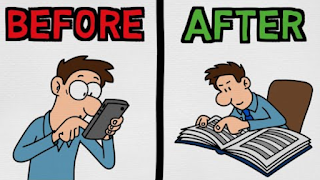Another interesting
video. This is from the 'Better Than Yesterday' YouTube channel.
How I Tricked My
Brain To Like Doing Hard Things (dopamine detox)
One activity is easy
and doesn't require much effort, while the other activity is
difficult and it requires you to apply yourself.
Q: Why are some people
more motivated to tackle difficult things?
Q: Is there a way to
make doing difficult things easy?
Dopamine is often
considered a pleasure molecule.
Dopamine is what makes
us desire things.
And it's that desire
that gives us the motivation to get up and do stuff.
You would think that
it's thirst or hunger that motivates us to get food or water.
But there's also
dopamine that plays a key role here.
If an activity releases
too little dopamine you won't have much motivation to do it.
But if an activity
releases a lot of dopamine, you'll be motivated to repeat it, over
and over.
Q: So which behaviours
release dopamine?
Any activity where you
anticipate there's a potential reward, releases it.
But if you know there
are no immediate rewards with the behaviour, your brain won't release
it.
Your brain doesn't even
care if the high dopamine activity is damaging for you.
Example: A drug addict.
He knows that what he's doing is not good for him. But all he wants
is to get more of that drug.
In today's digital
society, we are flooding our brains with unnaturally high amounts of
dopamine on a daily basis.
We're becoming like
those rats pulling the lever, trying to get a new dopamine hit.
It is harming you!
Our bodies have a
biological system called homestasis.
It means that our body
likes to keep internal physical and chemical conditions at a balanced
level.
Whenever an imbalance
occurs, our body adapts to it.
... one way
homeostatis manifests itself is through tolerance.
Your body tries to
maintain homeostasis, so it down-regulates your dopamine receptors.
Your brain gets used to
having high levels of dopamine and those levels become your new
normal.
You develop a dopamine
tolerance.
This can be a huge
problem, because the things that don't give you as much dopamine,
don't interest you any longer.
And it's much more
difficult to motivate yourself to do them.
Sadly, things like
working hard or reading, releases dopamine in lower amounts.
People who are addicted
to video games or social media, experience this lack of motivation.
Once their dopamine
tolerance gets too high, they simply aren't able to enjoy low
dopamine behaviours.
Q: Is there anything
that can be done to prevent this?
You need to perform a
dopamine detox.
You're going to set
aside a day (every week) where you're going to avoid all the highly
stimulating activities.
You're going to stop
flooding your brain with high amounts of dopamine and you're going to
let your dopamine receptors recover.
For 1 whole day you
will try to have as little fun as possible.
Basically you're going
to remove all sources of external pleasure for the entire day.
You're going to embrace
boredom.
Dopamine detox works
because you become so bored, that boring stuff becomes more fun.
Boredom is going to
propel you to do other things.
Ideally you should
avoid those (high dopamine) behaviours altogether, or at least as
much as possible.
Instead you want to
connect more dopamine to the things that will actually benefit you.
You could use your high
dopamine activity - at the end of the day - as a reward for
completing difficult work.
If you indulge in high
dopamine behaviour first, then you won't feel like doing the low
dopamine work.
If you have motivation
problems, start dopamine detoxing your brain as soon as possible.
We are all dopamine
addicts to a certain extent.
And that's a good thing
becomes dopamine motivates us to achieve our goals and improve
ourselves.
But it's up to you to
decide where you're going to get your dopamine from.
Are you going to get it
from things that don't benefit you?
Or are you going to get
it from working on your long term goals?
The choice is yours.
